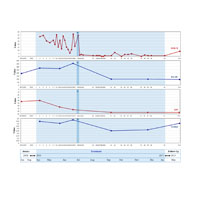Extending Blatt’s two-polarity model of personality development to dissociative identity disorder: a theory-building case study

Submitted: October 20, 2020
Accepted: March 24, 2021
Published: March 31, 2021
Accepted: March 24, 2021
Abstract Views: 2701
PDF: 1021
HTML: 37
HTML: 37
Publisher's note
All claims expressed in this article are solely those of the authors and do not necessarily represent those of their affiliated organizations, or those of the publisher, the editors and the reviewers. Any product that may be evaluated in this article or claim that may be made by its manufacturer is not guaranteed or endorsed by the publisher.
All claims expressed in this article are solely those of the authors and do not necessarily represent those of their affiliated organizations, or those of the publisher, the editors and the reviewers. Any product that may be evaluated in this article or claim that may be made by its manufacturer is not guaranteed or endorsed by the publisher.
Similar Articles
- Racheli Miller, Mark J. Hilsenroth, Paul L. Hewitt, Perfectionism and therapeutic alliance: a review of the clinical research , Research in Psychotherapy: Psychopathology, Process and Outcome: Vol. 20 No. 1 (2017)
- Valeria Condino, Annalisa Tanzilli, Anna Maria Speranza, Vittorio Lingiardi, Therapeutic interventions in intimate partner violence: an overview , Research in Psychotherapy: Psychopathology, Process and Outcome: Vol. 19 No. 2 (2016)
- Benedetto Farina, Marianna Liotti, Claudio Imperatori, Lucia Tombolini, Elena Gasperini, Paola Mallozzi, Marianna Russo, Giorgia Simoncini Malucelli, Fabio Monticelli, Cooperation within the therapeutic relationship improves metacognitive functioning: preliminary findings , Research in Psychotherapy: Psychopathology, Process and Outcome: Vol. 26 No. 3 (2023)
- Claudia Capella, Loreto Rodríguez, Estrella Azócar, Ximena Lama, Lucía Núñez, Daniela Águila, Camila Gomez, Macarena Espeleta, Vania Vasquez, Psychotherapeutic change in children and adolescents who have been sexually abused: a model from participants’ perspectives , Research in Psychotherapy: Psychopathology, Process and Outcome: Vol. 25 No. 1 (2022)
- Raquel Pereira, António Pazo Pires, David Neto, Therapist self-awareness and perception of actual performance: the effects of listening to one recorded session , Research in Psychotherapy: Psychopathology, Process and Outcome: Vol. 27 No. 1 (2024)
- Paola Manfredi, Claudia Taglietti, A psychodynamic contribution to the understanding of anger - The importance of diagnosis before treatment , Research in Psychotherapy: Psychopathology, Process and Outcome: Vol. 25 No. 2 (2022)
- Sara Salzano, Isa Zappullo, Vincenzo Paolo Senese, Massimiliano Conson, Carmela Finelli, Mario Mikulincer, Phillip R. Shaver, Validation and psychometric properties of the Italian version of the Power Behavioural System Scale , Research in Psychotherapy: Psychopathology, Process and Outcome: Vol. 26 No. 1 (2023)
- Cristina Marogna, Emanuele Montanari, Silvio Contiero, Klodjana Lleshi, Dreaming during COVID-19: the effects of a world trauma , Research in Psychotherapy: Psychopathology, Process and Outcome: Vol. 24 No. 2 (2021): SPECIAL ISSUE "Working on dreams, from psychotherapy to neuroscience"
- Laura Bonalume, Laura Corbelli, Mattia Ferro, Anna Lisa Mazzoleni, Maria Pia Roggero , Developing a prototype for relationship therapy psychoanalysis: an empirical study with the Psychotherapy Process Q-set , Research in Psychotherapy: Psychopathology, Process and Outcome: Vol. 26 No. 1 (2023)
- Cheri L. Marmarosh, Steven Sandage, Nathaniel Wade, Laura E. Captari, Sarah Crabtree, New horizons in group psychotherapy research and practice from third wave positive psychology: a practice-friendly review , Research in Psychotherapy: Psychopathology, Process and Outcome: Vol. 25 No. 3 (2022): SPECIAL ISSUE: "Group psychotherapy: between settled benchmarks and new horizons"
<< < 4 5 6 7 8 9 10 11 12 13 > >>
You may also start an advanced similarity search for this article.

 https://doi.org/10.4081/ripppo.2021.505
https://doi.org/10.4081/ripppo.2021.505




